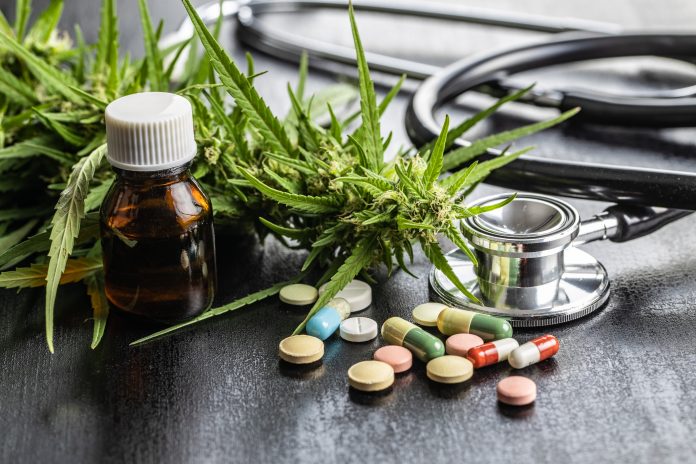SARMs and CBD: Navigating regulatory gaps in UK’s food industry – Unusual products blur the lines between food and medicine, prompting questions about effective regulation
Cannabidiol (CBD), as most people now know, is a non-psychoactive component of cannabis and a vogueish ingredient of countless products sold by numerous chemists and health food shops on UK high streets.
SARMs and CBD: what’s the connection?
SARMs, as a smaller but growing number of people know, are illegal muscle-building drugs with multiple side-effects that are sold (as the BBC found this summer) by hapless independent retailers (the acronym stands for ‘selective androgen receptor modulators’). So, what do they have in common with UK law?
The answer (spoilers) is that the Food Standards Agency (FSA) classes both as ‘novel foods’. But the route to reach that answer, and why it is so unsatisfactory, tells a revealing story about how UK law regulates foods, drugs, and the many things that are ‘in-between’.
SARMS and CBD: What else do they have in common?
In working out what SARMs and CBD products have in common, the starting point is to look at what they are not. Neither is marketed as a medicine – although their ads and labels often show signs of strain in their attempts to avoid or disclaim talk of medical benefits – they are not regulated by the Medicines and Healthcare Products Regulatory Agency (MHRA).
Neither is a controlled drug, either – although CBD products arguably cross that line where they contain even trace amounts of tetrahydrocannabinol (THC) – so there is no need for Home Office licensing in their manufacture, marketing, or sale.
And neither is subject to any bespoke set of regulations, as applied to (for instance) alcohol, cigarettes, or (nicotine-containing) vape products (or ‘e-cigarettes’).
Both are sold to consumers (although, as we’ll see, SARMs really shouldn’t be), which means that the general laws on product safety and trade descriptions apply.
But more specifically, insofar as both are designed to be ingested – SARMs are sold in pill form, while CBD comes in oil, as well as chocolate, coffee, tea bags, or even pasta – they both come under the jurisdiction of the FSA.
The ‘novel foods’ regime
That brings us to ‘novel foods’, a category designed to capture things intended to be eaten but that hasn’t been around for very long, for which the burden is essentially on the manufacturers to show the FSA, broadly speaking, that they are safe.
The principle is that while meats and vegetables we have been eating for centuries can (if properly prepared) be trusted, we should take a precautionary approach for products for which we don’t have that long-standing experience. The rules come from EU directives, but the FSA has stuck with them since Brexit.
SARMs are a perfect example of that principle. Synthetically produced, they were initially an experimental drug to treat muscle-wasting conditions and have since been repurposed to help fitness-seekers increase their muscle mass and strength.
But there are reports of side effects, including mood swings, liver problems, and erectile dysfunction. Despite the odd disclaimer on some containers that they are ‘not for human consumption’, these are pills meant to be ingested.
Unseen regulations: SARMs, CBD, and consumer awareness
The ‘novel foods’ law means that no product of that description can be sold unless and until the manufacturer has obtained a specific clearance for it from the FSA. so far, no SARMs have passed that test, so any sale of those products is illegal.
CBD is a much more controversial application of the principle. While there are synthetic varieties of CBD products (‘isolate’), many of them (‘full-spectrum) are natural, which prompted cries of alarm when the European Commission first lumped into the ‘novel foods’ category (having previously called it a narcotic).
The FSA has since given the green light to various CBD products, but there remain controversies about the use of the system for CBD and the way the FSA applies it.
More importantly, perhaps, it certainly seems fair to say that another thing the FSA’s decisions on CBD and SARMs have in common is that the vast majority of consumers have no idea about them; indeed, as the BBC’s report on SARMs found, many independent retailers have no idea either.
From another perspective, the fact that the FSA signs off as a product as safe says nothing about the product’s quality or whether its (usually caveated) health claims are worth anything.
That remains an issue for the Advertising Standards Agency (ASA) and trading standards departments of local authorities, increasingly coordinated by National Trading Standards (NTS).
This crazy-paving approach to regulation inevitably confuses consumers, and in some senses, the CBD and SARMs stories are about products that fall uncomfortably between the cracks.
Some options for reform
Does it have to be this way? Perhaps the US may have the right idea in regulating ‘food and drugs’ together, or maybe the MHRA’s remit could be usefully expanded: though its core expertise its medicines, it already handles traditional herbal and homeopathic remedies and receives notifications about e-cigarettes.
Its role in regulating medicinal cannabis products has prompted calls for it to take over the Home Office’s licensing role in connection with cannabis and psychedelics.
Others, notably a government-appointed taskforce to advise on regulatory opportunities post-Brexit, have suggested a new category of ‘nutraceutical’ products with health benefits but whose marketing stops short of rendering them ‘medicines’.
Other than giving some thought to what the type should be called, this certainly has the virtue of chiming with what consumers increasingly understand as a category of product whose space on the shelves of UK shops is likely to grow in the foreseeable future and which they are entitled to expect are regulated for quality as well as safety.
In an ideal world, CBD, SARMs, traditional herbal and homoeopathic remedies, and vapes would all be regulated clearly, with labelling to let consumers and retailers know they have been approved for sale.
For mainly historical rather than logical reasons, we are a long way from that. Each time a story emerges about products that fall between these cracks and whose regulatory status is poorly understood, the case for making legislative time to resolve this issue becomes more firm.
This piece was written and provided by John Binns, a partner in the business crime and regulatory department of BCL Solicitors LLP.











